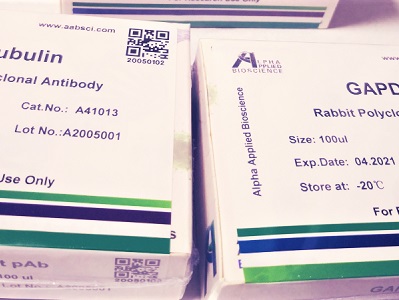

SSX rabbit pAb
Cat :A21947
-
Source
Rabbit
-
Applications
WB,IHC,ELISA
-
Reactivity
Human
-
Dilution
WB: 1:500 - 1:2000. IHC: 1:100-300 ELISA: 1:20000. Not yet tested in other applications.
-
Storage
-20°C/1 year
-
Specificity
SSX Polyclonal Antibody detects endogenous levels of SSX protein.
-
Source/Purification
The antibody was affinity-purified from rabbit antiserum by affinity-chromatography using epitope-specific immunogen.
-
Immunogen
The antiserum was produced against synthesized peptide derived from the C-terminal region of human SSX1/2/3/4/5/6/7/8/9. AA range:139-188
-
Uniprot No
Q16384
-
Alternative names
SSX1; Protein SSX1; Cancer/testis antigen 5.1; CT5.1; Synovial sarcoma, X breakpoint 1; SSX2; SSX2A; SSX2B; Protein SSX2; Cancer/testis antigen 5.2; CT5.2; Synovial sarcoma, X breakpoint 2; Tumor antigen HOM-MEL-40; SSX3; Protein SSX3;Cancer/testis antigen 5.3; CT5.3; SSX4; SSX4A; SSX4B; Protein SSX4; Cancer/testis antigen 5.4; CT5.4; SSX5; Protein SSX5; SSX6; Putative protein SSX6; SSX7; Protein SSX7; SSX8; Protein SSX8; SSX9; Protein SSX9
-
Form
Liquid in PBS containing 50% glycerol, 0.5% BSA and 0.02% sodium azide.
-
Clonality
Polyclonal
-
Isotype
IgG
-
Background
SSX family member 1(SSX1) Homo sapiens The product of this gene belongs to the family of highly homologous synovial sarcoma X (SSX) breakpoint proteins. These proteins may function as transcriptional repressors. They are also capable of eliciting spontaneous humoral and cellular immune responses in cancer patients, and are potentially useful targets in cancer vaccine-based immunotherapy. This gene, and also the SSX2 and SSX4 family members, have been involved in t(X;18)(p11.2;q11.2) translocations that are characteristically found in all synovial sarcomas. This translocation results in the fusion of the synovial sarcoma translocation gene on chromosome 18 to one of the SSX genes on chromosome X. The encoded hybrid proteins are likely responsible for transforming activity. Alternative splicing of this gene results in multiple transcript variants. A related pseudogene has been identified on chromosome X. [provided by RefSeq, Jul 2013],
-
Other
SSX1/SSX2/SSX3/SSX4/SSX5/SSX6/SSX7/SSX8/SSX9, Protein SSX1/Protein SSX2/Protein SSX3/Protein SSX4/Protein SSX5/Protein SSX6/Protein SSX7/Protein SSX8/Protein SSX9
-
Mol.Wt (Da)
21931/21620/21697/21858/21660/21688/21591/21859/21553
-
Concentration
1 mg/ml
| Product | Reactivity | Applications | Conjugation | Catalog | Images |
|---|
-
 400-836-3211
400-836-3211
-
 support@aabsci.com
support@aabsci.com
-
β-actin rabbit pAb ...... >
-
β-actin rabbit pAb(A284) ...... >
-
Plant-actin rabbit pAb ...... >
-
β-tubulin mouse mAb(M7) ...... >
-
GAPDH mouse mAb(2B8) ...... >
-
GAPDH mouse mAb(PT0325) ...... >
-
Histone H3 rabbit pAb ...... >
-
Histone H3 rabbit pAb ...... >
-
COX IV mouse mAb(6C8) ...... >
-
GFP-Tag mouse mAb(1G6) ...... >
-
HA-Tag mouse mAb(1B10) ...... >
-
mCherry-Tag mouse mAb(6B3) ...... >










 400-836-3211
400-836-3211
